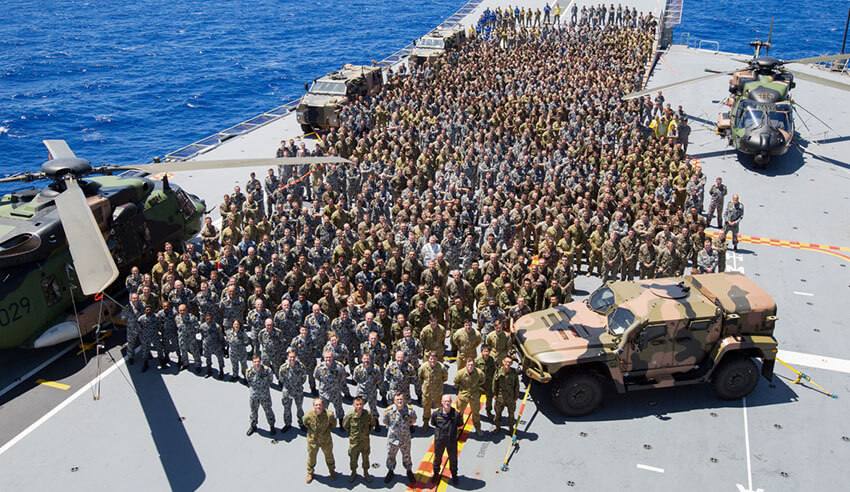Prime Minister Scott Morrison has used an address at Lavarack Barracks in Townsville to outline the government’s new Pacific engagement policy, while Defence Minister Christopher Pyne has doubled down on proposals to redevelop facilities at Manus Island to support Australia’s ‘Pacific pivot’.
On the back of recent announcements made by the Prime Minister regarding the nation's continuing and enhanced engagement with Asia. Prime Minister Morrison has launched a Australia's 'Pacific pivot', which will focus on enhancing the nation's strategic engagement and presence in the region.
"The long-term funding commitment is critical to executing the government's plans for Defence, and ensures that defence strategy, capability and resources are fully aligned," the Prime Minister said.
The nation's defence capabilities, service men and women and, now more than ever, industry are critical to enhancing the nation's ability to engage with and secure the Pacific region.
"Defence must have confidence in its funding so it can develop and implement long-term plans. Australian defence industry also needs funding certainty to confidently invest in the infrastructure, skills and capability so that it can play its part as a fundamental input to defence capability," PM Morrison said.
Australia's recent history of engagement with the region has been marred by three distinct scenarios:
- The military intervention in the Solomon Islands as part of the Regional Assistance Mission to Solomon Islands (RAMSI);
- The souring of diplomatic relations between Australia and Fiji; and
- The offshore processing of asylum seekers at Manus Island.
The nation's commitment to the region, however, is based on more than just these three engagements, rather Australia has, as outlined in the 2017 Foreign Policy White Paper, sought to re-engage with the Pacific and ensure that it remains one of the nation's highest foreign and defence policy priorities.
"The government that I have the privilege to lead is returning the Pacific to where it should be – front and centre of Australia’s strategic outlook, our foreign policy, our personal connections, including at the highest levels of government," PM Morrison said.
"This is our patch. This is our part of the world. This is where we have special responsibilities. We always have, we always will. We have their back, and they have ours. We are more than partners by choice. We are connected as members of a Pacific family," the PM said in response to concerns about the growing prominence of Chinese finance, aid and infrastructure development in the region.
Enhancing Australia's military capability in the region is essential to the success of the government's new 'Pacific pivot', and includes:
- An increased number of operational deployments by the Royal Australian Navy to the region to support maritime training exercises; and
- The local construction of the new Pacific Patrol Boats, which will be gifted to regional partners to support increased maritime security.
Foreign Minister Marise Payne reinforced the Prime Minister's comments, saying, "In addition to our Australia Pacific Security College and Fusion Centre, which will address gaps in training and information sharing in the Pacific, a new Pacific faculty at the Australian Institute of Police Management will train the next generation of police leadership in the Pacific.
"Our Defence Force will work with partners to build interoperability to respond together to the common security challenges that we face, including through the establishment of a new ADF Pacific Mobile Training Team."
Central to the mobility and functionality of this mobile training team is the introduction of a dedicated new vessel to deliver support to Australia's regional partners, including for humanitarian assistance and crisis response.
Further enhancing this announcement, the Prime Minister reaffirmed the government's commitment to develop the Lombrum Naval Base in Papua New Guinea to serve as a focal point for Australian leadership and defence capability in the region.
He said, "We’re co-operating to develop the PNG Defence Force’s Lombrum Naval Base... It will mean more Australian ships can visit PNG."
The Prime Minister highlighted the role Australia-based SMEs will play in supporting the nation's pivot to the Pacific, namely through key defence acquisitions including the $5.2 billion LAND 400 Phase 2 deal, which will provide the Army with 211 leading-edge Boxer CRVs, the $35 billion SEA 5000 Hunter Class frigates, which will serve as the backbone of Australia's surface fleet, and the $17 billion F-35 program.
"Now of course, our Defence capability plans do not end there – from new frigates and patrol vessels to the Joint Strike Fighter – all of these platforms draw on small and medium-sized enterprises from right across the nation," the Prime Minister said.
Australia's pivot to the Pacific provides new opportunities for Australian businesses of all shapes and sizes as the nation continues to invest in both regional infrastructure and defence capability to ensure the enduring peace, prosperity and stability of "our patch".
Have your say on the government's new 'Pacific pivot' policy in the comments section below, or get in touch with









